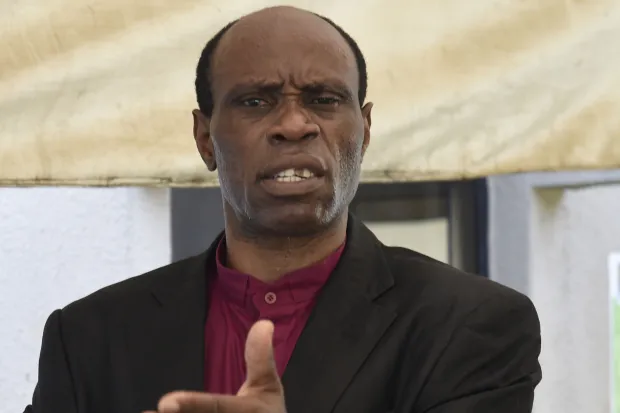Former Nigerian international and Super Eagles defender, Taribo West, has expressed deep anger and disappointment at the Nigerian Football Federation (NFF) and Lagos State Government for what he called the abandonment of the family of the late goalkeeper Peter Rufai.
Speaking emotionally at Rufai’s burial on Friday, West condemned the neglect of the family and questioned the country’s respect for its football heroes after their death.
“It’s disheartening that you have Lagos State, you have the Nigerian Football Association. They drop the bulk on the family,” West said in a video recording shared at the burial ceremony. “I felt in my spirit that there is nothing to put your life for. That’s why I say I have to shift back so that I will not implode. It’s grieving.”
West’s words struck a chord as he contrasted his reaction to the loss of his own parents with the overwhelming grief he felt at Rufai’s passing.
“My mother passed on. I never shed tears. My father passed on in my hands. I never shed tears. When Rufai passed on, I had goose pimples on my body. And every individual I’m speaking to, there were tears rolling down my cheeks. What kind of nation is this?” he lamented.
The ex-Inter Milan star went further to criticize Nigerian football authorities for their treatment of several national team legends, including the late Stephen Keshi, Rashidi Yekini, Thompson Oliya, and Yisa Sofoluwe.
“With this kind of example they have shown in Sofole, Stephen Keshi, Thompson Oliya and Rashidi Yekini, I will never advise even my son to put his feet for this country,” West declared. “Send me out! Do we have a Football Federation or do we have a Football Association in this Lagos State? That this hero, this soldier, this football evangelist, has to be treated this way in his family.”
He also expressed shock that Rufai’s family was forced to appeal for financial help within private groups to cover funeral expenses. “Could you imagine that the family would be crying just to solicit within our groups to ask for money? That is madness. Look, please let me go. I don’t want to pour my heart,” he said.
Peter Rufai was a celebrated Nigerian goalkeeper who served as the country’s first-choice goalie during the 1994 and 1998 FIFA World Cup tournaments. His outstanding performances helped Nigeria reach the Round of 16 in both tournaments, a feat that marked the country’s growing presence on the global football stage.
Rufai also featured prominently in the Africa Cup of Nations (AFCON), winning silver medals in 1984 and 1988 and lifting the trophy with Nigeria in 1994—the nation’s first-ever AFCON triumph.
Born in 1963, Rufai made his international debut in December 1981. Over a 14-year career with the national team, he earned recognition for his skill and leadership on the pitch. His club career took him across Europe, where he played in Belgium, the Netherlands, Portugal, and Spain.
Rufai passed away on July 3 at the age of 61 in a Lagos hospital after reportedly battling a long-term illness.
West’s public condemnation has reignited long-standing concerns about how Nigerian football authorities treat former players, especially after they retire or pass on. Fans and former players alike have expressed frustration over what they describe as a culture of neglect and poor recognition.
Many Nigerians expect the government and the NFF to do more in supporting the families of former players who have contributed to the nation’s sporting achievements.
Social media has been awash with tributes to Rufai and calls for reform, urging authorities to set up better welfare systems and pension plans for retired footballers.
The Nigerian Football Federation and Lagos State Government have not yet made an official response to West’s accusations or the funeral funding concerns.
However, the criticism highlights the pressure both institutions face to improve how they support football veterans. In recent years, there have been scattered reports of former players facing hardship, illness, and poverty without adequate assistance.
Taribo West, who played for top clubs like Inter Milan and was part of Nigeria’s national team during the 1990s, is known for his passionate personality both on and off the field.
His heartfelt remarks at Rufai’s burial have opened a wider conversation about respect, recognition, and support for Nigerian sportsmen who have given their all to the country’s football legacy.
West’s decision to speak out publicly also sends a powerful message to younger Nigerian players, highlighting the challenges that can come after a career ends.
Peter Rufai’s funeral and the response it has sparked serve as a reminder of the work still needed to build a system that honours sports heroes in Nigeria.
The football community is hopeful that the tragedy of Rufai’s passing will become a turning point—a call for the Nigerian Football Federation, government bodies, and private sector partners to come together and ensure that the contributions of players past and present are never forgotten.

